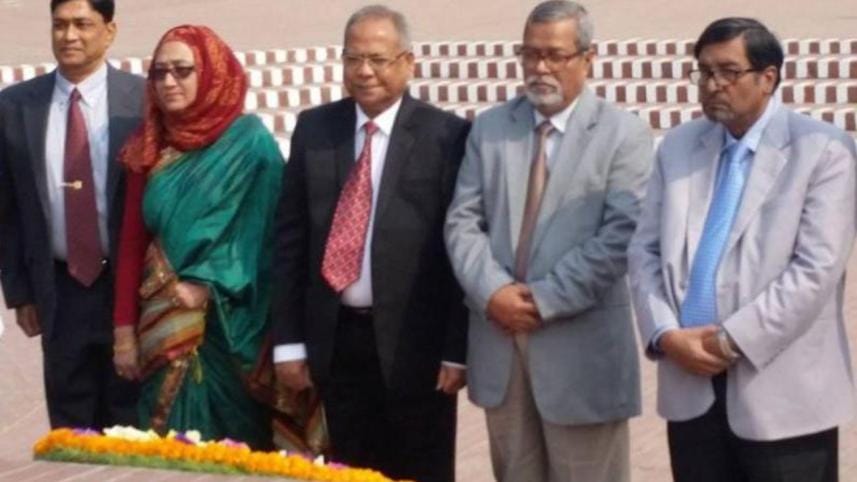EC seems to be in denial of ground realities

It's barely a secret that even after the election schedule was announced, the police filed hundreds, if not thousands, of so-called political cases against leaders and activists linked to the opposition. The media recently uncovered a new trend: "gayebi mamla" or "ghost cases". The curious terminology is derived from the fact that many of these cases were filed against non-resident, terminally ill or even dead people, and describe events that did not take place at all.
"Thousands of people are now waiting at the premises of the High Court to obtain bail," Barrister M Amir-ul Islam told a seminar recently, referring to BNP activists. "Will they campaign or secure bail or go to jail?"
The prime minister recognised this when she reportedly promised during the dialogue with the Oikyafront that she would ask to revise the "political" cases against opposition activists. The Chief Election Commissioner, too, appeared to acknowledge the phenomenon when he instructed the police high-ups not to harass anyone or lodge new cases without a court warrant.
However, in response to the CEC's directives, the police bosses arranged a meeting and came to the conclusion that nothing barred them from pursuing "criminal cases," according to multiple media reports. But here's the catch: cases filed to "harass" opposition activists are, more often than not, criminal cases.
One would expect the EC to confront the police for its non-committal tone. Instead, it seems to have taken a conciliatory position. "The police are not arresting anyone for no reason or without consulting us," the CEC later declared.
According to BNP's estimates published by numerous newspapers, as many as 1.2 million opposition activists were sued from 2017 to 2018 alone, with thousands imprisoned, despite the fact that this period was relatively calm as BNP carefully refrained from resorting to street agitation. Few would believe most of these cases are legally substantive, yet the EC seems to be very reluctant to do anything effective about this. In an ideal situation, such a policy of non-interference would sound perfectly legitimate. However, in a climate in which "ghost cases" abound, an intervention is quite necessary.
Since the restoration of democracy in the '90s, Bangladesh has seen four credible elections—all held under a non-partisan caretaker government. While a non-partisan government is certainly less likely to influence electioneering, the secret to its success was largely attributed to one particular strategy: sweeping and random reshuffling within the bureaucracy.
The outgoing government usually tries to design the bureaucracy in its favour, and thus the reshuffle was essential. The idea was that when a mid-level officer working, say, in an agricultural institution was made an all-powerful district commissioner, there would be less of a chance for him/her to be politically influenced. And, the stategy worked.
Now that the provision of the caretaker government no longer exists, the Oikyafront demands that similar steps be taken by the EC. It even alleged that a group of senior administration and police officials are plotting to maintain the status quo.
The EC categorically rejected their demands, declaring not a single transfer, let alone reshuffle, would take place without any evidence of wrongdoing. Once again, in a normal situation, the EC's position would seem perfectly fine. But in reality, the EC seems to simply be in denial of how things work here in Bangladesh.
Not only has the EC been unable to assert its authority over the bureaucracy and the police, but has also sought to restrict observers.
According to a report by The Daily Star, the number of observers in the 2008 election was four times that of this time, in spite of the number of voters and polling centres being much higher this time around. While this is partly because of the "lack of funds" for monitoring organisations, the EC's decision to reduce the number of monitoring organisations by half must have contributed to the decline in the number of observers.
What is even more surprising is that the EC delisted FEMA and Brotee, two of the oldest election monitoring organisations in the country, and revoked the registration of Odhikar, a critical human rights organisation, for seemingly trivial reasons. In this context, it is difficult to overlook the fact that they were all critical of the EC's role in the controversial 2014 election.
What's more, in recent days, the EC secretary issued a number of directives to prospective observers. For example, they were instructed to monitor polling "like a statue" and, as such, carry no mobile phones or cameras in the polling booth or talk to the media during live broadcast. Such restrictive directives are unprecedented, according to several long-time election observers.
In comparison to all these shortcomings of the EC, one particular issue may not seem like a big deal—and that is the nephew of the CEC being nominated by the ruling party. Some important questions need to be asked here. The Awami League is obliged to explain how the CEC's nephew, despite having literally no political prominence or experience, obtained his nomination, bypassing a coterie of politically active and experienced local aspirants including the current MP. The CEC is yet to clarify why this shouldn't amount to a conflict of interest.
In a nutshell, contrary to the EC's claims, an even-playing field remains elusive, while its sincerity now seems questionable. In the name of rules, it is simply shying away from using the vast powers at its disposal to address the realities on the ground and create a level playing field.
Nazmul Ahasan is a member of the editorial team at The Daily Star. His Twitter handle is: @nazmul_ahasan_




 For all latest news, follow The Daily Star's Google News channel.
For all latest news, follow The Daily Star's Google News channel.
Comments